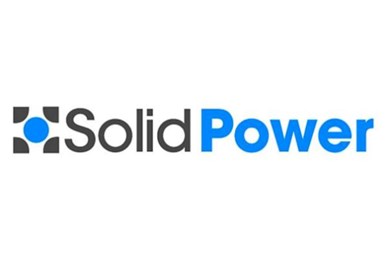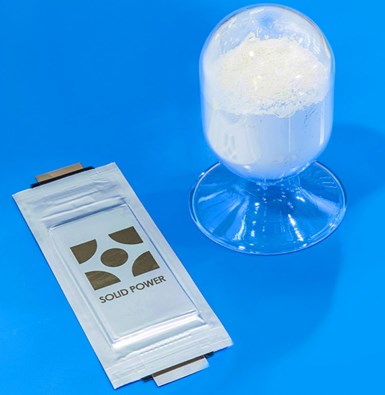Startup to Test Solid-State EV Cells in 2022
Solid Power says its next-gen battery could go into production in 2027.
Solid Power, a Colorado-based startup backed by BMW, Ford and Hyundai says it will begin testing its next-generation solid-state cell design for electric cars about 15 months from now.
Assuming all goes well, commercial production isn’t likely to begin until 2027. But there’s much ground to cover by then to prove the technology’s feasibility.

50% Greater Energy Density
Solid Power says the experimental cells it began making earlier this year offer 15%-20% more energy capacity than today’s lithium-ion devices, CEO Doug Campbell tells Bloomberg News.
The company has predicted that its high-capacity lithium metal anode design eventually will result in lithium batteries with 50% greater energy density. BMW has agreed to shepherd the technology through the validation process for EV applications.
Solid Power spun out of a battery research program at the University of Colorado-Boulder in 2014. Since then, the company has attracted $26 million in equity financing, including an undisclosed investment by Ford in April 2019.
CEO Doug Campbell tells Bloomberg that production batteries could launch as soon as 2025. But he says that will happen only with the help of “extensive cooperation” from a carmaker.
Competition Galore
Like other developers of all-solid-state batteries (ASSBs), Solid State touts the safety and simplicity of its design. ASSBs replace the flammable liquid electrolyte of typical lithium-ion batteries with a stable solid ion-conducting material.

A Solid Power cell and its sulfide solid electrolyte (Image: Solid Power)
Earlier this week another startup, QuantumScape, claimed it has conquered the performance tradeoffs of solid-state cells. The 10-year-old company, which is heavily backed by Volkswagen, says its cells have nearly twice the energy density of today’s lithium-ion devices, cost less and last longer.
VW has invested more than $300 million in QuantumScape to date. The two companies formed a joint venture in 2018, aiming to introduce the advanced technology by 2025.
Ready to Partner
Solid State doesn’t intend to open its own battery plant. It says its ASSB cells can be made in the same facilities that currently produce lithium-ion EV batteries.
Campbell says his company is more likely to partner with an established battery maker—or a carmaker that decides to produce its own devices. That assumes Solid State’s promising technology can survive the trip from a laboratory pilot line to EV-ready commercial production plant.
RELATED CONTENT
-
on lots of electric trucks. . .Grand Highlander. . .atomically analyzing additive. . .geometric designs. . .Dodge Hornet. . .
EVs slowdown. . .Ram’s latest in electricity. . .the Grand Highlander is. . .additive at the atomic level. . .advanced—and retro—designs. . .the Dodge Hornet. . .Rimac in reverse. . .
-
Multiple Choices for Light, High-Performance Chassis
How carbon fiber is utilized is as different as the vehicles on which it is used. From full carbon tubs to partial panels to welded steel tube sandwich structures, the only limitation is imagination.
-
GM Is Down with Diesels
General Motors is one company that is clearly embracing the diesel engine.








